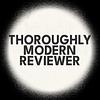Take a photo of a barcode or cover
adventurous
emotional
funny
sad
medium-paced
Plot or Character Driven:
Plot
Strong character development:
No
Loveable characters:
Yes
Diverse cast of characters:
No
Flaws of characters a main focus:
No
All the Doctors adventures from the Tardis point of view.
funny
informative
lighthearted
fast-paced
informative
reflective
fast-paced
Plot or Character Driven:
A mix
Strong character development:
N/A
Loveable characters:
Complicated
Diverse cast of characters:
Complicated
Flaws of characters a main focus:
No
emotional
funny
informative
fast-paced
Plot or Character Driven:
A mix
Strong character development:
Complicated
Loveable characters:
Yes
Diverse cast of characters:
Yes
Flaws of characters a main focus:
Yes
Really really liked this. The way this book was set from the point of view of the tardis but detailing all the adventures of the doctor in all their regeneration made this incredibly readable - I read it in only a couple of sittings which for a book of this length is incredible. Really brought all the doctors adventures to life.
adventurous
funny
informative
lighthearted
reflective
fast-paced
Plot or Character Driven:
Character
Strong character development:
Complicated
Loveable characters:
Yes
Diverse cast of characters:
Yes
Flaws of characters a main focus:
Complicated
A cute idea with a fairly adequate execution, attempting to retell nearly all of Doctor Who -- from An Unearthly Child in 1963 through The Legend of Ruby Sunday in 2024 -- from the perspective of the alien hero's wondrous time machine. To author Steve Cole's credit, this book meticulously covers every single classic serial and modern-era episode in that span with at least a couple sentences apiece, and occasionally offers a fun take on persistent continuity questions.
(The Brig, Sarah Kingdom, and Wilf are all deemed official companions of the Doctor, or "strays" as the narrator calls them, and the UNIT dating controversy -- a plot hole concerning contradictory indicators whether certain stories take place in the contemporary 70s or near-future 80s -- is due to the TARDIS itself returning to the same spacetime coordinates so often in those days that the timeline got a bit frazzled. And did you know that the inner technology of the contraption shifts in response to the time period around it, hence why it had more wires and levers in the 60s and more digital display screens today? The book even posits that the Fugitive Doctor's TARDIS similarly took on the appearance of a police box due to psychically sensing that form in the later Doctor's mind, which is a satisfactory enough answer to another puzzle that's plagued fans since its introduction.)
On the weaker side, a lot of this information reads like just one long monotonous recap, and I'm not quite sure who the intended or ideal audience for it would be. It's too spoiler-y for anyone not already deep in the trenches for this franchise, and yet it doesn't exactly provide those of us from within that group with much new material. The text itself is presented somewhat like a personal narrative, but it repeatedly loops back and goes over the same stretch again and again: we hear the general story of each Doctor incarnation, then a short biography of each companion, and then the detailed episode-by-episode account, which obviously all cover common ground. And despite being written in the voice of the TARDIS, that inhuman narrator merely relates events with some occasional irreverent commentary, rather than undergoing any sort of meaningful plot or character arc.
The choice of what to include or not is odd, too. The two crossovers on The Sarah Jane Adventures make the cut, as do some of the supplemental minisodes like The Night of the Doctor, Clara and the TARDIS, and Destination: Skaro, but others like Time Crash are left out, as is the Twelfth Doctor's appearance on Class and everything from the wider licensed Whoniverse like the Big Finish audio dramas (with the exception of those offscreen companions listed by name in The Night of the Doctor, who get a similar shout-out here). The book moreover ends in a curious place, at the start of the penultimate episode of the show that's aired to date. After all of the earlier details that would spoil a reader who hadn't seen the relevant episodes yet, Cole for some reason plays coy about who the ultimate villain of that latest season turns out to be and doesn't mention anything about the finale at all. Was there a concern on the BBC's part that someone would read this title while having watched all 61 years of the series barring that one last hour? Were they so concerned about preserving a certain twist that they embargoed it for a tie-in novel that wouldn't be published until well after the season had concluded? Was the manuscript due before the writer could watch Empire of Death for himself?
So it has a few issues. I've still appreciated this work as a chance to revisit a show that I love, but I have to say that it doesn't do much beyond scratching the itch of reminding us about particular installments, without diving deeper at moments when it feels like it could. (The Doctor's Wife, for instance, that magical Neil Gaiman script when the TARDIS first comes to life and speaks on-screen, isn't highlighted as especially more significant than the stories around it. They didn't even get actress Susanne Jones to read the audiobook, which seems like a no-brainer to me.) One exception that does deserve highlighting is the TARDIS's anger and resentment at the Third Doctor for ripping out its innards and tinkering with them like a car mechanic, which strikes me as the most distinctive element this volume contributes to the wider canon. Most of the rest of it, unfortunately, doesn't make much of a lasting impression.
Like this review?
--Throw me a quick one-time donation here!
https://ko-fi.com/lesserjoke
--Subscribe here to support my writing and weigh in on what I read next!
https://patreon.com/lesserjoke
--Follow along on Goodreads here!
https://www.goodreads.com/user/show/6288479-joe-kessler
--Or click here to browse through all my reviews!
https://lesserjoke.home.blog
(The Brig, Sarah Kingdom, and Wilf are all deemed official companions of the Doctor, or "strays" as the narrator calls them, and the UNIT dating controversy -- a plot hole concerning contradictory indicators whether certain stories take place in the contemporary 70s or near-future 80s -- is due to the TARDIS itself returning to the same spacetime coordinates so often in those days that the timeline got a bit frazzled. And did you know that the inner technology of the contraption shifts in response to the time period around it, hence why it had more wires and levers in the 60s and more digital display screens today? The book even posits that the Fugitive Doctor's TARDIS similarly took on the appearance of a police box due to psychically sensing that form in the later Doctor's mind, which is a satisfactory enough answer to another puzzle that's plagued fans since its introduction.)
On the weaker side, a lot of this information reads like just one long monotonous recap, and I'm not quite sure who the intended or ideal audience for it would be. It's too spoiler-y for anyone not already deep in the trenches for this franchise, and yet it doesn't exactly provide those of us from within that group with much new material. The text itself is presented somewhat like a personal narrative, but it repeatedly loops back and goes over the same stretch again and again: we hear the general story of each Doctor incarnation, then a short biography of each companion, and then the detailed episode-by-episode account, which obviously all cover common ground. And despite being written in the voice of the TARDIS, that inhuman narrator merely relates events with some occasional irreverent commentary, rather than undergoing any sort of meaningful plot or character arc.
The choice of what to include or not is odd, too. The two crossovers on The Sarah Jane Adventures make the cut, as do some of the supplemental minisodes like The Night of the Doctor, Clara and the TARDIS, and Destination: Skaro, but others like Time Crash are left out, as is the Twelfth Doctor's appearance on Class and everything from the wider licensed Whoniverse like the Big Finish audio dramas (with the exception of those offscreen companions listed by name in The Night of the Doctor, who get a similar shout-out here). The book moreover ends in a curious place, at the start of the penultimate episode of the show that's aired to date. After all of the earlier details that would spoil a reader who hadn't seen the relevant episodes yet, Cole for some reason plays coy about who the ultimate villain of that latest season turns out to be and doesn't mention anything about the finale at all. Was there a concern on the BBC's part that someone would read this title while having watched all 61 years of the series barring that one last hour? Were they so concerned about preserving a certain twist that they embargoed it for a tie-in novel that wouldn't be published until well after the season had concluded? Was the manuscript due before the writer could watch Empire of Death for himself?
So it has a few issues. I've still appreciated this work as a chance to revisit a show that I love, but I have to say that it doesn't do much beyond scratching the itch of reminding us about particular installments, without diving deeper at moments when it feels like it could. (The Doctor's Wife, for instance, that magical Neil Gaiman script when the TARDIS first comes to life and speaks on-screen, isn't highlighted as especially more significant than the stories around it. They didn't even get actress Susanne Jones to read the audiobook, which seems like a no-brainer to me.) One exception that does deserve highlighting is the TARDIS's anger and resentment at the Third Doctor for ripping out its innards and tinkering with them like a car mechanic, which strikes me as the most distinctive element this volume contributes to the wider canon. Most of the rest of it, unfortunately, doesn't make much of a lasting impression.
Like this review?
--Throw me a quick one-time donation here!
https://ko-fi.com/lesserjoke
--Subscribe here to support my writing and weigh in on what I read next!
https://patreon.com/lesserjoke
--Follow along on Goodreads here!
https://www.goodreads.com/user/show/6288479-joe-kessler
--Or click here to browse through all my reviews!
https://lesserjoke.home.blog
adventurous
emotional
funny
hopeful
informative
inspiring
lighthearted
reflective
medium-paced
Plot or Character Driven:
Character
Strong character development:
Complicated
Loveable characters:
Yes
Diverse cast of characters:
Complicated
Flaws of characters a main focus:
Complicated
A memoir told from the point of view of the TARDIS seems like a really cool idea in concept. But on execution, “I, TARDIS” reads like a collection of Wikipedia articles. Brief recaps of almost every “Doctor Who” adventure and brief bios of the Doctor’s companion - but from the point of view of the TARDIS. It reads more like one of those out-of-universe behind the scenes books than it does a real in-universe memoir. It’s cool, but it doesn’t hold a candle to something like “A Brief History of Time Lords”.




